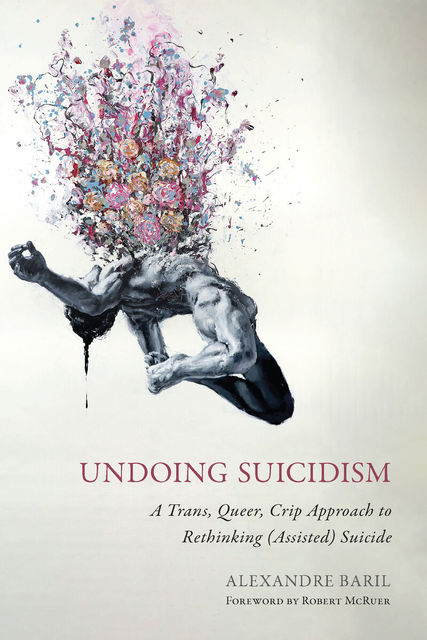Undoing Suicidism
A Trans, Queer, Crip Approach to Rethinking (Assisted) Suicide
International Congress of Qualitative Inquiry 2025 Qualitative Book Award
2024 International Association of Autoethnography and Narrative Inquiry Outstanding Book Award (Honorable Mention)
In Undoing Suicidism, Alexandre Baril argues that suicidal people are oppressed by what he calls structural suicidism, a hidden oppression that, until now, has been unnamed and under-theorized. Each year, suicidism and its preventionist script and strategies reproduce violence and cause additional harm and death among suicidal people through forms of criminalization, incarceration, discrimination, stigmatization, and pathologization. This is particularly true for marginalized groups experiencing multiple oppressions, including queer, trans, disabled, or Mad people.
Undoing Suicidism questions the belief that the best way to help suicidal people is through the logic of prevention. Alexandre Baril presents the thought-provoking argument that supporting assisted suicide for suicidal people could better prevent unnecessary deaths. Offering a new queercrip model of (assisted) suicide, he invites us to imagine what could happen if we started thinking about (assisted) suicide from an anti-suicidist and intersectional framework.
Baril provides a radical reconceptualization of (assisted) suicide and invaluable reflections for academics, activists, practitioners, and policymakers.
Cover illustration: Paolo Troilo, BLOOM! 2020.
Acrylic on canvas painted with fingers, 47.2 × 70.8 in. (120 × 180 cm).
Instagram: paolotroilo54.
Website: troilo54.com.
Courtesy of the Rolandi private Art Collection, Milan, Italy.
Reviews
“Undoing Suicidism is a tremendous contribution to theorizations of living and dying. It is unsettling in the most productive manner and driven by a profound abolitionist philosophy of desires for death as the grounds for a richer, more responsive politics of life. Baril offers a compelling vision of justice for suicidal people that demands rethinking some of the most cherished ideals of liberal personhood.” —Jasbir K Puar, author of The Right to Maim: Debility, Capacity, Disability
“In this important book Alexandre Baril offers a queercrip reframing of (assisted) suicide that explains and critically intervenes in suicidism (the oppression of suicidal people) and ableist, sanist, and ageist arguments about assisted suicide. Justice, care, and support for suicidal people requires questioning what Baril calls ‘compulsory aliveness’ and listening to, rather than criminalizing and pathologizing, suicidal people. This is an extraordinary and well-researched book. Baril’s care-full approach to this difficult topic makes a crucial contribution to queer, trans, feminist, and crip theories and challenges readers to rethink dominant responses to suicide.” —Kim Q. Hall, Professor of Philosophy, Appalachian State University, and author of Queering Philosophy
“Undoing Suicidism is a daring, original, and paradigm-shifting book that directly challenges the taken-for-granted idea that suicidal thoughts and actions are unnatural, undesirable states that should always be prevented. Grounded in queer, trans, Mad, and crip theoretical frameworks, and deeply informed by the author’s first-hand experience as a suicidal person, Baril imagines a radically different world where the well-documented harms caused by suicidism and preventionist logic are replaced with practices of compassion and solidarity, which grant all people the freedom to explore, express, live with, and sometimes die by, suicide.” —Jennifer White, Professor in the School of Child and Youth Care at the University of Victoria, and lead editor of Critical Suicidology: Transforming Research and Prevention for the 21st Century
"Drawing from insights in Crip and Mad studies, Baril endeavors to reconceptualize suicide, considerate of the interconnected violences of suicidism, ableism and sanism. But the crescendo of this book is in how this analysis profoundly shifts how we might consider assisted suicide, in ways that acknowledges the multiple and interlocking forms and structures of violence intersecting with suicide and that necessitate social action, all the while affirming a political practice far more radical than that of neoliberalism.… Baril’s work on suicidism is undoubtably one the most significant pieces of theorizing on suicide of the last century.”—Canadian Journal of Disability Studies
“Informed by abolitionist politics which question the power that states and institutions hold over the conditions of life and death, Baril advances a meticulous critique of both existing suicide prevention measures, and the growing number of ‘assisted dying’ laws which are being introduced in many jurisdictions. His arguments draw from an immensely detailed review of empirical evidence, philosophical accounts of suicide and death, and theoretical insights from queer, trans, and crip academics plus community workers.”—Symbolic Interaction
"Undoing Suicidism is a necessary intervention and corrective to the study of suicide. His approach is nothing short of radical in its interrogation of the foundational assumptions that have guided critical perspectives on suicide for more than 100 years when sociologists began studying it. Baril shows us that perhaps the true value of life is not found in life itself but in welcoming all the opportunities it affords, including being able to choose when to say goodbye to our loved ones and to ourselves."—Disability & Society
About the Author
Alexandre Baril is Associate Professor in the School of Social Work at the University of Ottawa. He is the recipient of the 2021 Equity, Diversity, and Inclusion President’s Award at the University of Ottawa and the 2020 Francophone Canadian Disability Studies Association Tanis Doe Award for his contributions to research and activism on disability.
Table of Contents
Metadata
- isbn978-1-4399-2408-2
- publisherTemple University Press
- publisher placePhiladelphia, PA
- rightsCopyright 2023. Available under a CC BY-NC-ND 4.0 license.
- rights holderTemple University-Of The Commonwealth System of Higher Education


